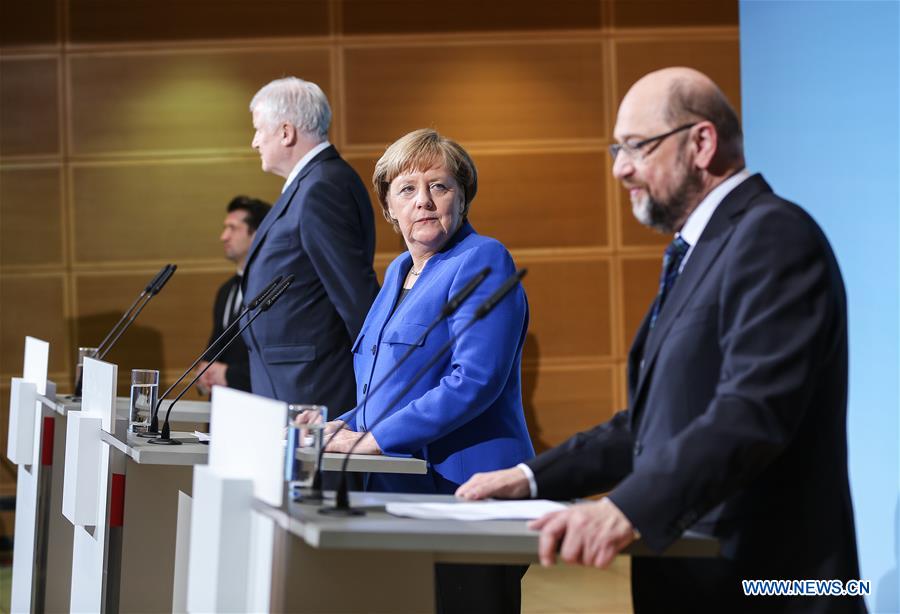
German Chancellor and leader of German Christian Democratic Union (CDU) Angela Merkel (C), leader of German Christian Social Union (CSU) Horst Seehofer (L) and leader of German Social Democratic Party (SPD) Martin Schulz attend a joint press conference after coalition talks at the headquarters of SPD, in Berlin, Germany, on Jan. 12, 2018. German Chancellor Angela Merkel's conservatives and the Social Democrats (SPD) on Friday achieved a breakthrough in their exploratory talks aimed at forming a new coalition government, local media reported. (Xinhua/Shan Yuqi)
BERLIN, Jan. 12 (Xinhua) -- German Chancellor Angela Merkel's conservatives and the Social Democrats (SPD) on Friday achieved a breakthrough in their exploratory talks aimed at forming a new coalition government, local media reported.
The progress will probably put an end to months of political uncertainty in Germany after the Sept. 24 elections, when no new government was formed.
After overnight talks, the three parties, Merkel's Christian Democratic Union (CDU), its sister party the Christian Social Union (CSU), and the SPD will present the 28-page blueprint to party members, Focus Online reported.
They agreed not to raise taxes if they form a governing alliance and would limit the number of refugees entering the country to between 180,000 and 220,000 per year.
Merkel and the SPD also agreed to limit family reunions for refugees to 1,000 a month, clearing a main stumbling block to coalition talks.
The three parties also consented to strengthen the European Union, especially on making more money flow from Germany to Brussels, reports said.
There has been no formal announcement of a deal so far.
After the elections, the CDU tried to broker a coalition with two smaller parties, but failed. A continuation of the coalition with the SPD is considered the only viable alternative.
In terms of the climate issue, leaders of the parties have reportedly agreed to drop Germany's target of reducing carbon emissions by 40 percent by 2020.
The three parties will enter formal and detailed coalition talks after each side agrees on the outcomes of the exploratory talks.
The SPD has scheduled a special national conference on Jan. 21 in Bonn, where party members will vote whether to join the formal grand coalition talks or not.
However, the SPD is still facing strong opposition to a renewed grand coalition, especially from its grassroots and youth members, who are worried about further marginalization of the party in its cooperation with the CDU.
Observers and members of the three parties hope that the breakthrough in the talks will help avoid a minority government led by Merkel or snap federal elections.
The negotiations came more than three months after the national elections saw large losses for the CDU, CSU and SPD, which together had been governing as a "grand coalition" since 2013.
The new grand coalition will see the far-right populist Alternative fur Deutschland as the largest opposition party in the Bundestag, the federal parliament.















